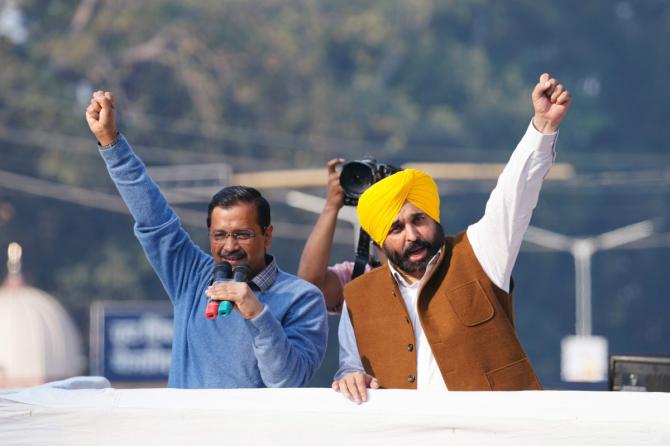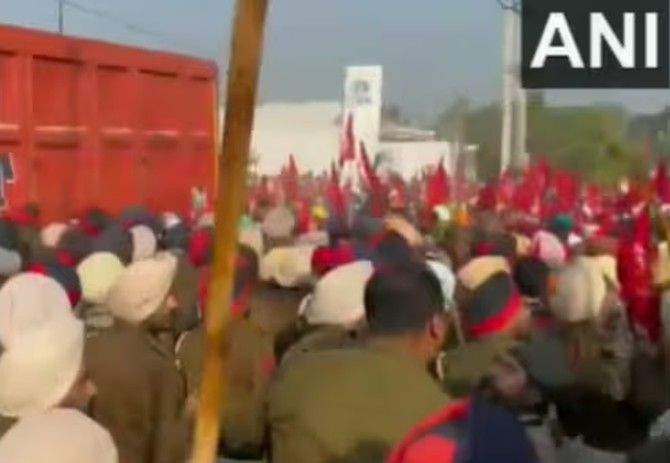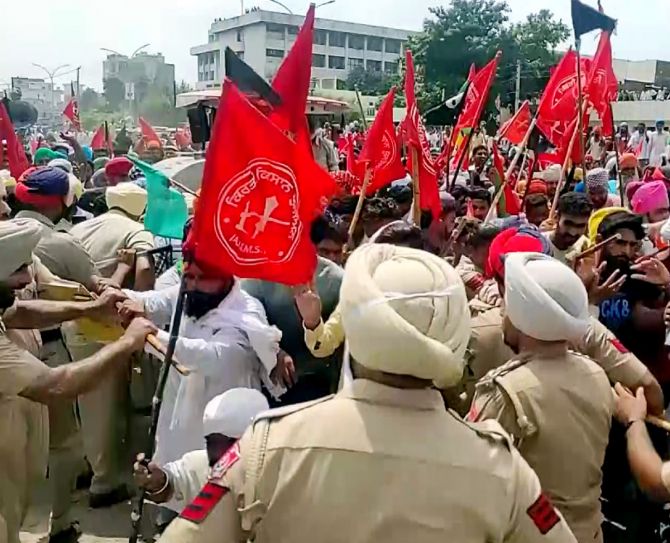Bhagwant Mann and Arvind Kejriwal are realising that it is not a cakewalk to run a full state that is plagued with a fiscal deficit and where emotions run high at the drop of a hat, observes Sudhir Bisht.

As I switched on my television at about 4 pm LAST week, I saw scenes of the large number of protesters being struck with lathis in the agrarian state of Punjab.
The live telecast was straight from Sangrur district where the protesters had gathered near Punjab Chief Minister Sardar Bhagwant Mann's rented accommodation.
The local police resorted to a moderate cane charge as the agitators refused to leave the protest site, which had resulted in the blocking an important road.
The protest had not lasted even a day and yet the protestors were at the receiving end of the cane charge.
A video link of the lathi-charge can be seen here (external link).
The cane charge on the protesting labourers, and it includes farm labourers, is in complete contrast to the treatment that Bhagwant Mann's Aam Aadmi Party had given to the protesting farmers who had blocked the entry and exit points at the Delhi border, at Singhu, Tikri and Ghazipur, during the farmers' agitation.
I am referring to the agitation that began towards the end of November 2020 and lasted a full year.
AAP leaders had not only given vocal and moral support to the agitating farmers for one full year, Delhi's AAP CM Arvind Kejriwal had even visited the protest sites to ensure that the protesters were given all basic facilities like water, electricity and clean toilets.
Kejriwal and his entire cabinet had visited the camp of protesting farmers a day before the year-long agitation began, to oversee the arrangements.
He had said he was the 'sewadar' of the protesting farmers. Sewadar roughly translates to one who provides free service to devotees.

Let me turn my attention to Sangrur in Punjab where hundreds of protesting labourers gathered at the Patiala-Bhatinda highway and marched towards their popular CM's rented house.
They claimed they had a prior appointment, but their CM was not there at that time.
Electronic media reports suggest that Mann was busy campaigning in Gujarat when his fellow Punjabis were receiving cane blows in his home constituency.
The workers had gathered under the aegis of the Sanjha Mazdoor Morcha, a coalition of many labour unions, some of which are Zameen Prapti Sangharsh Committee; the Punjab Khet Mazdoor Union, the Pendu Mazdoor Union; the Punjab Khet Mazdoor Sabha; the Mazdoor Mukti Morcha; the Kul Hind Khet Mazdoor Union; the Dihati Mazdoor Sabha.
These unions have demanded a hike in daily wages from Rs 282 to Rs 700 a day under the Mahatma Gandhi National Rural Employment Guarantee Act (MGNREGA).
For comparison, the daily wage under MGNREGA, being given in the neighbouring state of Haryana, is Rs 331 per day, about 17% more than in Punjab.
Their other demands include the free distribution of plots measuring five 'marlas' among Dalits and scheduled castes.
To those who are not versed with the land sizes in Punjab, five marlas equal to roughly 1,360 square feet of land.
The agitating men and women were also asking for a 33% reservation for Dalits in village cooperative societies and the withdrawal of old cases against all the protesting labourers.
None of the demands appear fair and can be even termed outlandish, but there could have been several ways of handling such a situation.
A lathi-charge so soon doesn't seem reasonable for the AAP government that had provided regular oxygen to the farmers' protests outside Delhi, not so long ago.

The farmers' protest outside Delhi borders was in support of the repeal of the three farm bills and almost all Opposition parties had expressed support to the agitating farmers who blocked one side of the two most important national highways of modern India.
The protestors refused to allow access of their platform to every political party.
They made an exception in the case of AAP as its top leaders visited the protest sites on a daily basis.
Arvind Kejriwal even visited the protesting farmers at Singhu border before the start of the agitation and gave them full support in setting up camps and blocking the highways partially.
I recall clearly that neither the Haryana police nor Uttar Pradesh police had resorted to cane-charging against the farmers within the camps where farmers had stayed put for over one year.
The state governments did use force, but very, very sparingly, and we are talking of an agitation that lasted over one year.
AAP leaders and supporters were seen as the chief political backers of the siege of Delhi that led to huge inconvenience to vehicles -- commercial as well as civil and government -- in entering and exiting Delhi from the Haryana/UP side.
What has led to this completely contrasting behaviour of the two AAP governments in dealing with the two sets of protesters?
The AAP government in Delhi appeared to enjoy the farmers' protest while the AAP government in Punjab couldn't withstand the labourers' protest even for a day. The answer is obvious.
The first protest was against the Union government and the recent protest is against the AAP government in Punjab.
The farmers' protest contained the possibility of denting the image of the Modi regime while the Sangrur protest was seen as having the potential to sully the image of the AAP regime.
Mann is undoubtedly the most popular AAP leader after Arvind Kejriwal.
He is sharp and witty and is seen by the Punjabis as one of them.
He speaks in 'theth (rustic)' Punjabi and his speeches appear to be coming straight from the heart, sincere and spontaneous.
Or so was the case before April 2022.
A few months after he was sworn in as CM of Punjab, Bhagwant Mann, the MLA from the Dhuri constituency in Sangrur district, appears evasive, dodgy and unsure of himself.
There is a general impression that he is not his own man and looks towards Delhi for guidance.
People not so kind say that Mann doesn't seek mere guidance from Delhi. He waits for instructions from Delhi in resolving even minor administrative issues.
And if his boss in Delhi, Arvind Kejriwal, is too busy, no decision is taken in the state of Punjab.
These are stories, of course, and appear exaggerated but can there be smoke without any fire?
The Punjab CM, who used to recite poems in support of agitating farmers when he was just an MP, now avoids meeting the people who come with their demands.
In fact, the protesting labour unions are very agitated by the CM's failed promise to meet them.
It is one thing to rise in support of protestors when a leader is out of power and completely another thing to face up to them when the buck stops at that leader.
Bhagwant Mann has been an object of much criticism for his frequent visits outside Punjab.
His honeymoon visit some time ago and his missed flight at Frankfurt caused huge embarrassment to his party.
His act of touching the feet of Arvind Kejriwal and Manish Sisodia after getting elected as the Punjab CM caused much discomfort among the proud Punjabis.
The 'summoning' of the Punjab chief secretary to Delhi in April this year for a meeting with the Delhi CM also led to allegations of Mann's government being remotely controlled from Delhi.
The fact that the Punjab chief secretary met Arvind Kejriwal in Delhi, in the Punjab CM's absence, led to justified criticism.
Bhagwant Mann and Arvind Kejriwal are realising that it is not a cakewalk to run a full state that is plagued with a fiscal deficit and where emotions run high at the drop of a hat.
The lathi-charge on protesting unions ended after protestors were assured that the CM would meet them in December.
This is not the first time that such a promise has been made, only to be broken later, and I hope that Bhagwant Mann gets his act together before the patience of various protesting groups runs out.
The biggest irony of the protest that was quickly quelled is that the top police officer of Sangrur district completely denied that any sort of lathi-charge took place.
He said so even as his cane-wielding cops were live on all television channels, striking powerful blows on the agitators.
Alas, this can happen only in India!
Dr Sudhir Bisht, author and columnist, writes from New Delhi. He has more than two decades of experience in oil companies in India and abroad.
Feature Presentation: Rajesh Alva/Rediff.com











 © 2025
© 2025